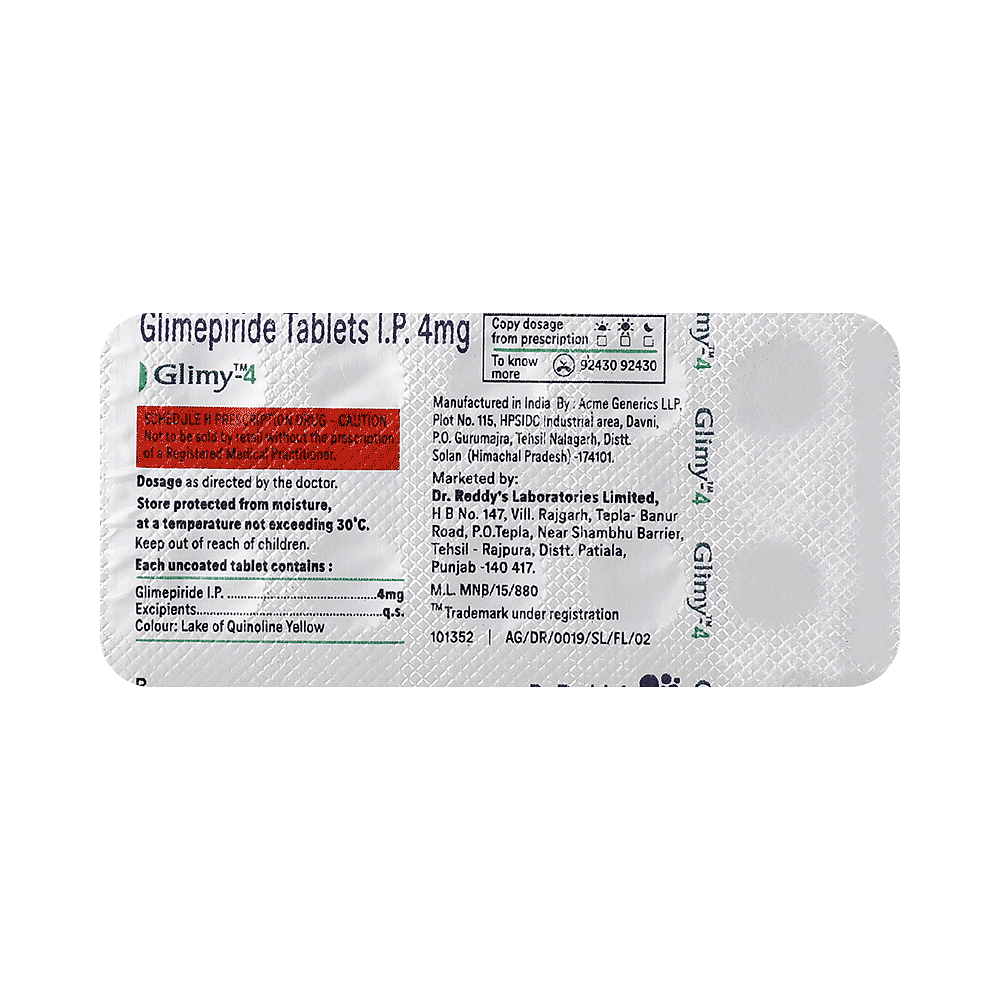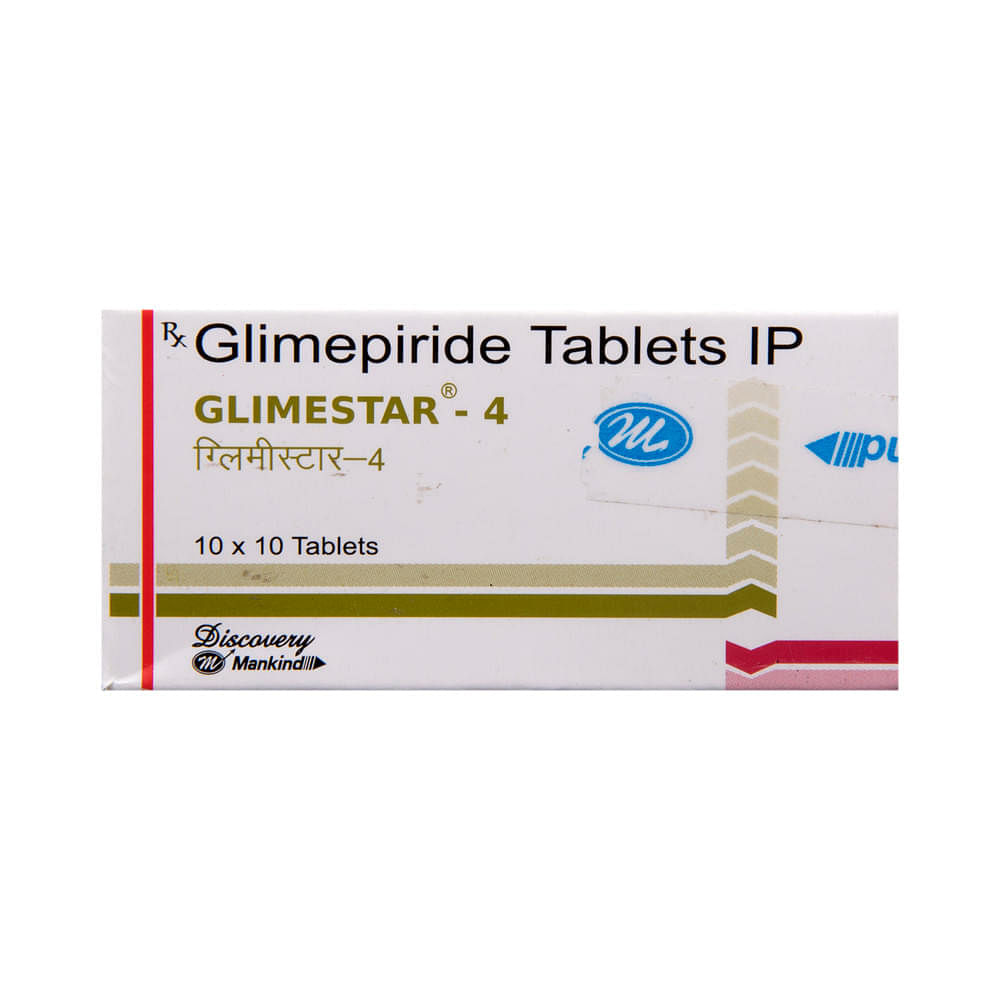
Glimicer 4mg Tablet
Manufacturer
Retra Life Science Pvt Ltd
Salt Composition
Glimepiride (4mg)
Key Information
Short Description
Glimicer 4mg Tablet is a sulfonylurea medication used to treat type 2 diabetes mellitus in adults, helping to control blood sugar levels and prevent serious complications.
Dosage Form
Tablet
Introduction
Glimicer 4mg Tablet is an antidiabetic medication that belongs to a group of medicines called sulfonylureas. It is used to treat type 2 diabetes mellitus in adults. It helps control blood sugar levels in people with diabetes thereby preventing serious complications of diabetes such as kidney damage and blindness.
Directions for Use
Take this medicine in the dose and duration as advised by your doctor. Swallow it as a whole. Do not chew, crush or break it. Glimicer 4mg Tablet is to be taken with food.
How it works
Glimicer 4mg Tablet is an antidiabetic medication. It works by increasing the amount of insulin released by the pancreas in order to lower blood glucose.
Quick Tips
Be careful while driving or operating machinery until you know how Glimicer 4mg Tablet affects you. Always carry some sugary food or fruit juice with you in case you experience hypoglycemic symptoms such as cold sweats, cool pale skin, tremor and anxiety.
Related Medicines

Glimy 4 Tablet

Zoryl-4 Tablet

Diapride-4 Tablet

Glador 4 Tablet

Glimisave 4 Tablet

Glimiprex 4 Tablet

Glimestar 4 Tablet

Glimfirst 4mg Tablet

Glimsy 4mg Tablet

Copride 4mg Tablet
Frequently asked questions
What is the dosage of Glimicer 4mg Tablet?
The recommended starting dose of Glimicer 4mg Tablet is 1 mg or 2 mg once daily, taken with breakfast. Your doctor may adjust this dose based on your individual needs and health status. The maximum recommended dose is 8 mg once daily.
Does Glimicer 4mg Tablet make you sleepy?
Glimicer 4mg Tablet itself does not cause sleepiness. However, it may cause hypoglycemia (low blood sugar) when used with other anti-diabetes medications. This can lead to dizziness, shaking, anxiety, irritability, a fast heartbeat, and confusion.
Is Glimicer 4mg Tablet safe for kidneys?
Glimicer 4mg Tablet is generally safe for patients with normal kidney function. However, its use should be avoided in patients with severe kidney disease since the medication is primarily eliminated by the kidneys.
Does Glimicer 4mg Tablet cause memory loss?
No, it is not known that Glimicer 4mg Tablet causes memory loss. However, the use of Glimicer 4mg Tablet may cause low blood sugar, which can lead to problems with concentration and reduced alertness.
Who should not take Glimicer 4mg Tablet?
Glimicer 4mg Tablet should be avoided by patients who are allergic to it, have severe kidney or liver disease, have G6PD-deficiency (an inherited condition affecting red blood cells), or are due to have surgery. Additionally, patients who are trying to get pregnant, are pregnant, breastfeeding, or have insulin-dependent diabetes (Type 1) should consult their doctor before taking this medication.
Can Glimicer 4mg Tablet cause dizziness?
Yes, Glimicer 4mg Tablet can cause dizziness as a side effect. If you experience dizziness while traveling, it is recommended to sit or lie down until the symptoms pass. Carrying some sugary food or fruit juice with you may also help alleviate these symptoms.
Can people with diabetes have proteins?
Yes, people with diabetes must include proteins along with other essential nutrients in their daily diet. Proteins are one of the major energy providers among all essential nutrients and can be broken down into glucose to release energy, though at a slower rate than carbohydrates.
Are artificial sweeteners good for people with diabetes?
No, artificial sweeteners are not good for people with diabetes. They are composed of chemicals that can cause mild to severe side effects, making it best to limit or avoid their use as much as possible.
Can diabetes cause kidney failure?
Yes, uncontrolled diabetes can cause kidney failure through a condition called diabetic nephropathy, which is a major cause of kidney failure in patients with diabetes. The best way to prevent damage to kidneys is by keeping diabetes in check, making dietary changes, monitoring sugar levels regularly, getting routine blood tests done, and taking prescribed medications on time.
Can diabetes be cured?
Diabetes can be managed through simple lifestyle changes, diet, and medications. While there may not be a definitive cure for the condition itself, individuals can lead healthy lives by controlling their blood glucose levels, preventing serious health complications, and managing symptoms effectively.


